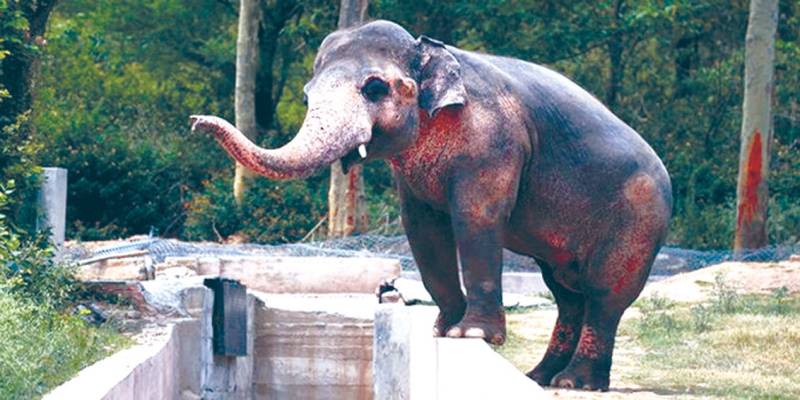ISLAMABAD - Having spent more than three decades in Pakistan, Kaavan, the lone elephant is finally going to start his new journey of natural habitat in Cambodian wildlife park with his new buddies leaving a tale of happiness and sorrow behind in Capital’s Marghazar Zoo.
Popularly known as ‘the lone elephant,’ Kaavan has been in the country since 1985 when it was given by the Sri Lankan government as a calf only a year old. In 1990, he got a partner named Saheli who died in 2012 and since then Kaavan has been lonely. Wildlife officials cited Kaavan’s “increasingly violent” behaviour, which was mainly due to the death of his mate, as the reason he was bound.
In 2002, zookeeper used to temporarily chain him due to increasingly violent behaviour. Outrage over the treatment of Kaavan at the capital’s zoo went global several years ago with a petition garnering more than 200,000 signatures after it emerged he was being chained up.
Kaavan became the subject of a high-profile rights campaign after it was revealed in 2015 that he was regularly being chained for several hours a day. He was obese, terribly lonely and in the need of foot care which cannot be provided at the Islamabad zoo due to lack of facilities.
Following the outcry, Islamabad High Court in May ordered wildlife authorities to free and transport Kaavan to a sanctuary where he could be well taken care of.
The move would allow Kaavan to go into its natural habitat where he would interact with over 80 pachyderms in the Cambodian park under the care of wildlife experts. The judge also instructed that all the 878 other animals held in Islamabad’s zoo be relocated within 60 days of the order.
The ruling was celebrated with enthusiasm in Pakistan and by Kaavan’s campaigners across the world. American music icon and animal rights activist Cher also shared her delight on her twitter account after the court ordered freedom for Kaavan.
Earlier this month, a team of veterinarians from Four Paws International, a global animal welfare organisation, came to Islamabad to examine Kaavan to see if he was fit to travel.
After the checks, which confirmed Kaavan was strong enough to relocate to an animal sanctuary in Cambodia, Dr. Amir Khalil, FOUR PAWS veterinarian and mission leader said that due to malnutrition and lack of physical exercise, Kaavan showed visible signs of obesity.
His nails were cracked and malformed which could be attributed to the inappropriate flooring and structure of his enclosure. To solve this issue, he needed to go through a long-term foot care programme, which could not be performed in Marghazar Zoo.
Dr Anis-ur-Rehman, the chair of the Islamabad Wildlife Management Board (IWMB) told APP that preparation to relocate an animal of five and a half tons was quite a big task. His customised crate is being made. He will live in his new cage for a while to get familiar with the environment and then he will be flown to Cambodia in the same crate.
This whole process can take up to two months as now Kaavan is being trained by his new vet Dr Khalil from Four Paws.
Capital residents seemed to be rather sad about Kaavan’s departure. “My children and even my grandchildren grew up seeing Kaavan and it will be sad to see him off. Marghazar Zoo is going to be deserted without Kaavan but this step is needed for his own good,” said Nadeem Malik, an old resident of sector G-7.
Nimra Khan, a primary school teacher, said that taking children to zoos and making them familiar with nature and its creation is very important.
“My students will miss Kaavan as he was the only elephant in the Zoo and kids always tried to be friendly with him whenever they took a school trip to the zoo,” she added.
According to wildlife experts, this step was also significant in preventing the extinction of Asian elephants.
The average lifespan of Asian elephants in captivity is 47.6 years in Europe and 41.9 years in North America, while they can live up to 60 years in the wild. Classified as endangered, the International Union for the Conservation of Nature has put the Asian Elephant on the Red List.






